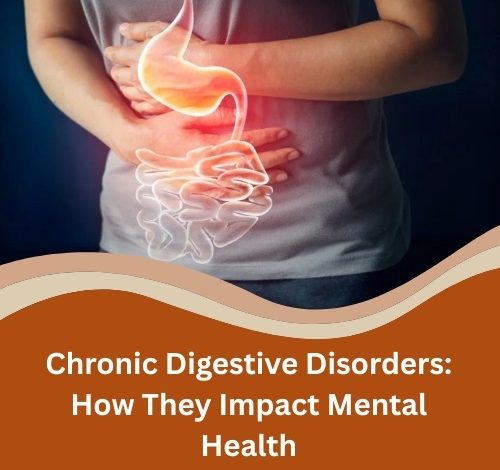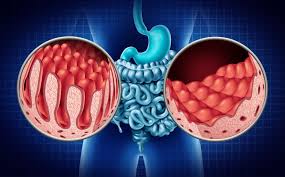Chronic Digestive Disorders: How They Impact Mental Health

Chronic digestive disorders don’t just affect the stomach or intestines—they can have a far-reaching impact on overall well-being, especially mental health. If you live with a condition like gastroparesis, irritable bowel syndrome (IBS), inflammatory bowel disease (IBD), or coeliac disease, you’re probably familiar with the emotional toll it can take. Persistent pain, food restrictions, social limitations, and fear of unpredictable symptoms can create a strong link between the gut and the brain.
In recent years, researchers and clinicians alike have placed increasing attention on the relationship between digestive issues and psychological well-being. Anxiety, depression, fatigue, and even disordered eating patterns often accompany gastrointestinal (GI) conditions, making effective management more than just a physical necessity—it’s a mental health priority as well.

In this article, we’ll explore the real impact chronic digestive disorders can have on your mental health, and how recognising this connection can support more holistic approaches to treatment—including options like diet changes, psychological therapy, and natural remedies for gastroparesis and other GI disorders.
The Gut-Brain Connection: Why It Matters
The gut and the brain are closely linked through a system called the gut-brain axis. This involves direct communication between the central nervous system (the brain and spinal cord) and the enteric nervous system (the ‘second brain’ in your gut). These two systems exchange signals via hormones, neurotransmitters, and the vagus nerve. What happens in your gut can affect how you feel emotionally, and vice versa.
If you have chronic digestive symptoms, your gut is constantly sending distress signals to your brain. Over time, this can lead to increased stress, low mood, or chronic anxiety. Similarly, stress or depression can disrupt digestion and worsen symptoms like bloating, diarrhoea, or nausea. This cycle can be hard to break—but recognising it is the first step toward managing it effectively.
Common Digestive Disorders and Their Emotional Effects
Let’s look at a few chronic digestive disorders and how they typically affect mental well-being.
Gastroparesis
Gastroparesis is a condition in which the stomach takes too long to empty its contents, leading to symptoms like nausea, vomiting, early satiety, bloating, and abdominal pain. These symptoms often interfere with daily life and social situations, which can increase feelings of isolation and helplessness.
It’s not uncommon for people with gastroparesis to experience health anxiety, particularly around eating. Because food often triggers symptoms, you may begin to fear mealtimes. In some cases, this can even lead to disordered eating habits. Over time, these struggles may evolve into depression or generalised anxiety disorder.
Related Article: Top 6 Gastroparesis Supplements You Need to Try Today!
Fortunately, there are a growing number of options to manage this condition holistically. Many people now explore natural treatment for gastroparesis, focusing on diet changes, herbal supplements, stress management, and gut-friendly lifestyle habits. These approaches can ease symptoms and support both physical and mental health.
Irritable Bowel Syndrome (IBS)
IBS is known for its unpredictable pattern of abdominal discomfort, bloating, and altered bowel habits (either diarrhoea, constipation, or both). The unpredictability alone can generate anxiety, especially around travel, work, or social engagements. Many people with IBS develop anticipatory anxiety, constantly worrying about when the next flare-up will happen.
Inflammatory Bowel Disease (IBD)
Crohn’s disease and ulcerative colitis fall under the umbrella of IBD. These autoimmune conditions involve chronic inflammation of the digestive tract, and often come with pain, fatigue, and the need for lifelong treatment. Living with a disease that requires regular medication or surgery can significantly impact your mental health.
The psychological burden of IBD is compounded by stigma and the fear of incontinence, both of which can lead to social withdrawal. Many people with IBD also report higher levels of depression and anxiety, particularly during flares.
Coeliac Disease
Coeliac disease involves an immune reaction to gluten that damages the small intestine. The treatment requires lifelong adherence to a strict gluten-free diet, which can be socially isolating. Eating out, attending events, or travelling can become stressful. Over time, this constant vigilance can contribute to increased anxiety and depression.

The Emotional Toll: Mental Health Symptoms Linked to Digestive Disorders
Living with chronic digestive problems can affect your mental health in several ways:
- Anxiety: Worrying about symptoms, flare-ups, or finding a bathroom in time.
- Depression: Low mood due to persistent symptoms, isolation, and lack of control.
- Body image issues: Especially common when bloating or weight fluctuations occur.
- Disordered eating: Fear of eating certain foods or skipping meals altogether.
- Social withdrawal: Avoiding social settings due to embarrassment or fatigue.
- Sleep disturbances: Night-time symptoms or anxiety may prevent restful sleep.
These emotional struggles aren’t imagined—they are valid and deserve proper attention.
Why This Connection Is Often Overlooked
Many people with digestive issues are told to focus only on their physical symptoms. Unfortunately, the psychological side is often neglected in consultations, despite the well-documented link between GI disorders and mental health.
Some feel hesitant to bring up emotional distress with a GP or gastroenterologist, thinking it’s unrelated or fearing they’ll be dismissed. However, you’re not alone, and your mental health is just as important as your physical symptoms.
In fact, studies have shown that people with digestive disorders are more likely to suffer from anxiety and depression compared to those without. That’s why a complete approach—addressing both mind and body—offers the best chance for lasting relief.
Natural Support for Digestive Disorders and Mental Well-being
Although medical treatment is often necessary for chronic GI conditions, many people also benefit from complementary approaches. A combination of dietary strategies, mental health care, and natural remedies for gastroparesis and other digestive disorders can offer a more sustainable path to relief.
Dietary Changes
Modifying your diet is often one of the first steps. In the case of gastroparesis, small, frequent meals that are low in fat and fibre may reduce symptoms. For IBS, a low FODMAP diet might help. Working with a dietitian can prevent nutritional deficiencies and help restore a healthier relationship with food.
Mindfulness and Stress Reduction
Mindfulness-based stress reduction, meditation, yoga, and breathing exercises are all helpful tools. Reducing stress can directly improve gut function and ease both physical and emotional symptoms.
Psychological Therapy
Cognitive behavioural therapy (CBT), acceptance and commitment therapy (ACT), and gut-directed hypnotherapy have all shown positive outcomes in patients with IBS and similar conditions. Therapy can help reframe anxious thoughts, improve coping skills, and reduce symptom-related fear.
Herbal and Natural Remedies
Several people with gastroparesis report symptom relief from herbal options such as ginger, peppermint oil, and traditional medicines. Ginger, in particular, is known to support gastric motility. These can be found in forms like teas, capsules, or tinctures. You can learn more about natural treatment for gastroparesis that may complement conventional care without replacing medical advice.
Probiotics and Gut Health
Supporting your gut microbiome is another angle worth exploring. Probiotics and fermented foods may improve symptoms of IBS and reduce inflammation, potentially easing anxiety as well, thanks to the microbiome’s effect on the brain.
Talking to Your Doctor About Mental Health
If you’re struggling emotionally due to your digestive disorder, bring it up with your healthcare provider. It’s not a separate issue—it’s part of your overall health. Be honest about how symptoms affect your mood, stress levels, sleep, and quality of life.
Your doctor may refer you to a psychologist or psychiatrist who understands the connection between chronic illness and mental health. A multidisciplinary approach—where gastroenterologists, dietitians, and mental health professionals collaborate—can offer the most effective support.
Supporting a Loved One With a Digestive Disorder
If someone you care about lives with a chronic digestive disorder, your understanding and patience can make a big difference. Avoid minimising their symptoms or suggesting they “just relax”—instead, ask how you can help. Encourage them to talk about how they’re feeling and to seek support when needed.
Simple gestures like helping with meal planning, being flexible with social outings, or just listening without judgement can ease their emotional burden.
Final Thoughts
Digestive health and mental well-being are more connected than many realise. Living with a chronic digestive disorder like gastroparesis, IBS, or IBD can trigger anxiety, depression, and emotional exhaustion. However, recognising the relationship between the gut and the brain opens the door to more effective, holistic care.
From therapy and stress reduction to diet modifications and natural remedies for gastroparesis, there are a variety of ways to support both your digestive system and your emotional health. If you’re experiencing emotional distress alongside physical symptoms, don’t dismiss it. You deserve care and relief on every level—physical, emotional, and psychological.




